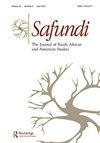Autochthonous oralities and coral islands: imagining “the people” in the poetry of William Carlos Williams and the Southern Fugitives
IF 0.2
Q4 AREA STUDIES
Safundi-The Journal of South African and American Studies
Pub Date : 2020-07-02
DOI:10.1080/17533171.2020.1773050
引用次数: 0
Abstract
ABSTRACT This paper returns to early twentieth-century America’s concern with democracy and “the local” in order to frame the populist parameters of poetic appeals to “the people” in the work of the Southern Fugitive poets on the one hand, and William Carlos Williams on the other. It argues that the Southern Fugitives’ commitment to what Chantal Mouffe identifies as a populist politics of antagonism runs counter to Williams’s very different attempt to grapple with the idea of “the people.” The Fugitives’ claims to a form of constitutional autochthony depended upon the violent exclusion of Native and African-American “uninhabitants”: the negative requirement for the decidedly populist continuation and preservation of what Allen Tate explicitly called “White rule.” By contrast, Williams’s more self-reflexive lyrical voice foregrounds the epistemological limitations of the poetic imagination and hence the problematic maneuvers by which a “people” may be conscripted into the service of populist national allegories.本土语言与珊瑚岛:威廉·卡洛斯·威廉姆斯和南方逃亡者诗歌中的“人民”想象
本文回归到二十世纪初美国对民主和“地方”的关注,以构建南方逃亡诗人和威廉·卡洛斯·威廉姆斯作品中对“人民”的诗歌诉求的民粹主义参数。它认为,《南方逃亡者》对尚塔尔·墨菲(Chantal Mouffe)所认定的民粹主义对抗政治的承诺,与威廉姆斯(Williams)截然不同的试图解决“人民”概念的尝试背道而驰。逃亡者对某种形式的宪法自治权的主张,依赖于对土著和非裔美国人“非居民”的暴力排斥:这是对艾伦·泰特明确称之为“白人统治”的民粹主义的坚决延续和保存的消极要求。相比之下,威廉姆斯更多的自我反思的抒情声音强调了诗歌想象的认识论局限性,因此,“人民”可能被征召为民粹主义国家寓言服务的问题策略。
本文章由计算机程序翻译,如有差异,请以英文原文为准。
求助全文
约1分钟内获得全文
求助全文
来源期刊
CiteScore
1.00
自引率
0.00%
发文量
0

 求助内容:
求助内容: 应助结果提醒方式:
应助结果提醒方式:


